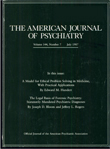TO THE EDITOR: We appreciate the comments by the APA Commission on Psychotherapy by Psychiatrists—especially in light of our desire to construct a dialogue around critical issues that need urgent attention by the field. It is particularly gratifying that this letter should come from distinguished colleagues who serve on a component of the APA and whose leadership is sorely needed. Although we respect their opinion of our article, we were disappointed that it focused solely on the proposed training model and did not address the main issue of the article (which was its major impetus): the current crisis in academic psychiatry. Moreover, their disputation of our proposed training program did not provide any alternative ideas (in terms of policy, training, or service) for how to deal with the challenges that confront our field as did a recently published article by distinguished colleagues (
1), which proposed modifications in psychiatry's orientation that were similar to ours.
In terms of the proposed training model, we must admit that there is a disagreement between us and the Commission with regard to conceptualizing and specifying education that anticipates the role of psychiatric graduates in the next millennium. Our proposal calls for psychiatrists to continue to have sufficient training in the fundamentals of psychotherapy and human psychology to be able to conduct psychotherapeutic intervention should they so desire. It is our contention, however, that psychotherapy already is and certainly can be conducted by nonphysicians at a level of competence equal to that of psychiatrists for the so-called “worried well” patients and the general (but not severely ill or comorbidly complicated chronic) patients. In these circumstances, residents should learn how to do these therapies in a briefer and more efficient time interval than is currently provided. In fact, their identity as psychiatrists would be strengthened rather than weakened by our proposal, since they would avoid the common internal debate that typically occurs in the second year of residency: “Am I a social worker? Am I a psychologist? Am I a doctor? What is a psychiatrist?” We view psychiatry as a subspecialty of internal medicine and a specialty that deals with psychopathology and all forms of disturbed affect behavior, cognition, and motivation whether from genetic, environmental, general medical, or other etiologies. In this context we feel that the greater time that trainees would spend in neurology and general medicine recommended in our proposal would facilitate the identification of trainees as physicians, rather than impair their identification as psychiatrists. The art of forming the doctor-patient relationship, a therapeutic alliance, and the psychodynamics and psychology of managing people with psychiatric symptoms or syndromes can and should be learned in general medical, neurological, and psychiatric patients.
We recommended that the first 2 years of residency should not be restricted to inpatients, since length of stay is remarkably short and not expected to increase, but should include outpatient experiences in general medical and neurological practices, with appropriate psychiatric supervision to provide learning of the key elements suggested by Dr. Clemens and colleagues.
Clemens et al. also state that psychotherapy is no less a medical treatment than pharmacotherapy. If that were true, that would mean that social workers, psychologists, and others are performing medical treatments. We respectfully disagree with this point. Psychotherapy is a treatment that can be provided by physicians and nonphysicians alike. It is medical in that psychotherapeutic methods have been used and should be used to treat various general medical as well as psychiatric conditions. However, there is nothing inherently medical in its theory or methods.
Our recommendations certainly do not preclude a continuing emphasis and experience in the psychological aspects of psychopathology—including learning psychotherapy firsthand by doing it. It is our contention, however, that trainees can still learn “the fundamental elements” of psychodynamic, cognitive, behavioral family, and group theories and treatments while increasing emphasis is placed on neurobiological, neuroanatomic, neuroscientific, and general biological systems as they affect learning and psychopathology. We also recommended a specialty track option for residents who wish to concentrate specifically and become in-depth experts on the conduct of psychotherapy and psychosocial rehabilitation programs for the severe, complex, or chronically mentally ill patients. Dr. Clemens and colleagues note that psychiatrists of the future will be dealing with the most difficult and challenging patients—a prediction with which we agree.
Finally, the Commission contends that our recommendations to increase general medical and neurological perspectives and to reduce (but
not, it is important to add, eliminate) emphasis on psychological, psychotherapeutic, and psychodynamic factors in understanding psychopathology or procedures in dealing with those conditions would reduce the attraction of psychiatry to medical students. Clemens et al. state that psychiatric residents would be partially trained internists and neurologists, which would blur professional identity and potentially attract fewer physicians to our field. To this point we suggest that the degree to which applications to psychiatric training programs would be affected by the proposed changes is at best speculative. Moreover, the current situation is already worrisome with numbers of medical students who choose careers in psychiatry being at near historic lows (
2). One could say that the level of current training is such that we already are turning out partially trained psychologists. Finally, we would foresee a time much as Dr. Shore has suggested (
3) in which the general medical and neurological problems of psychiatric patients would be managed by psychiatrists as their principal caregivers.
To put this argument succinctly into context, we would view psychiatry as standing on three pillars of knowledge: general medicine, neurology, and psychology. We see the current emphasis in training to be largely on psychology with too little on general medicine and neurology. We are not proposing the removal of one of the three pillars on which the field rests but rather are recommending a modest shift in the emphasis in training and a subsequent shift in practice that psychiatrists would be undergoing, which is not to be dictated by economic forces but rather by optimal treatment for our patients.

